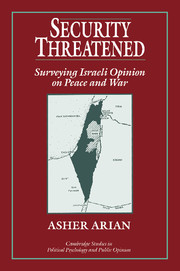2 - Overcoming Threat
Published online by Cambridge University Press: 06 July 2010
Summary
– Woe to those who are at ease in Zion.
(Amos 6:1)Considering the advantages of Israel's adversaries in terms of population and natural resources, one might expect Israelis to view their security future with feelings of low confidence. On the whole, however, this has not been the case. Israelis were generally confident when it came to their perceptions of potency in the long confrontation with their neighbors. Part of this confidence rested on the unquestioned success of much of the record. Since it had looked bleak in the past and somehow the worst was averted, the gap between the threat perceived and the belief in the ability to overcome peril was narrowed. The consistent generalization, even though there were fluctuations in the details, was that Israelis felt secure in an objectively threatening situation.
The mood eroded over the decades; political solutions seemed unattainable, terror continued and even intensified, and the military threat persisted. Simultaneously, the limitations of national power in dealing with these issues seemed to become clearer, and the opening of dialogue with the enemies of the recent past seemed to engender a more realistic assessment. By the mid-1990s the mood appeared to be more in keeping with the enormity of the challenges facing the country. Over the years, there were swings between euphoria and pessimism; the assessment often proved too glum when there was danger, and too exuberant when the danger momentarily passed (Levy 1994).
- Type
- Chapter
- Information
- Security ThreatenedSurveying Israeli Opinion on Peace and War, pp. 24 - 53Publisher: Cambridge University PressPrint publication year: 1995



